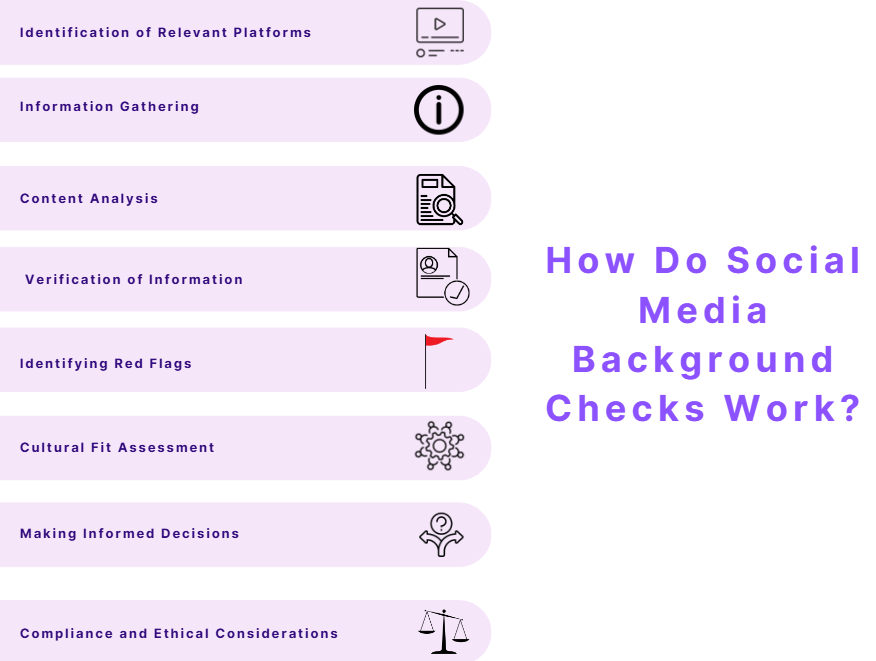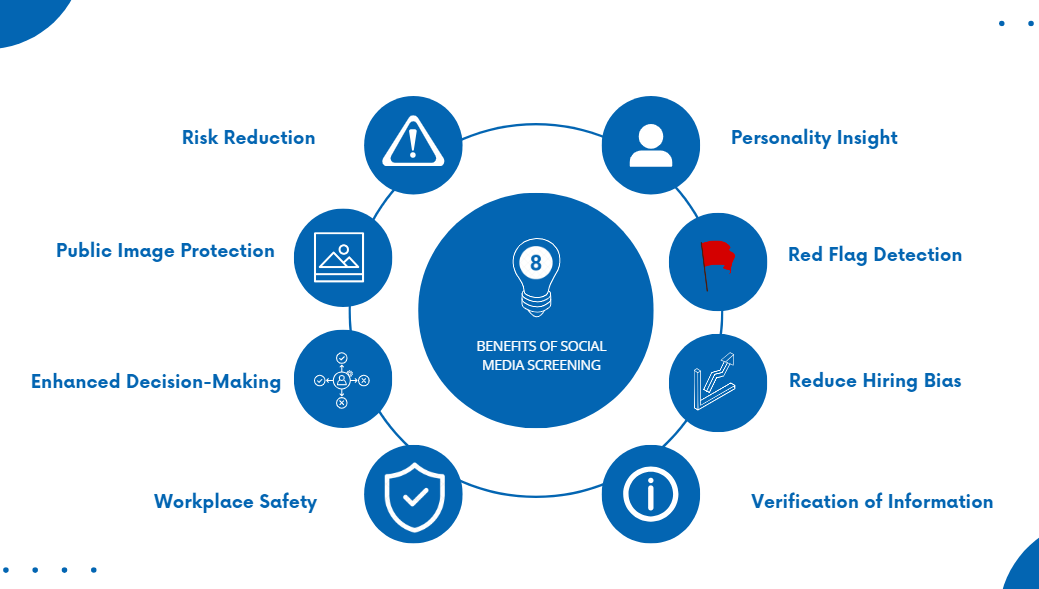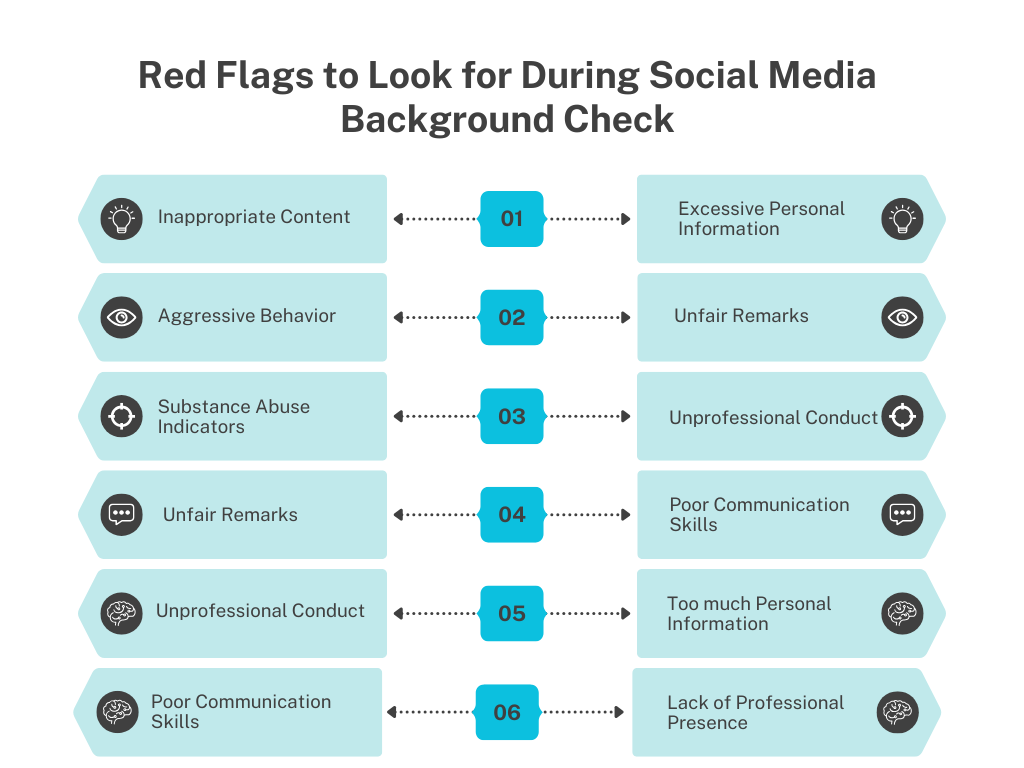How Do Social Media Background Checks Work?

Social media profiles offer employers a deeper understanding of job applicants’ online behavior. In fact, most employers (91%) now review social media profiles as part of their background screening processes, as it allows them to gain more insight into potential hires.
Social Media Background Check analyzes publicly available information on social platforms, helping to assess whether an applicant’s behavior aligns with the company’s values. A Social Media Analyst can help interpret this information to assess candidates effectively.
Let’s dive into how social media background checks work, what information is reviewed, and why this process has become a significant step in hiring.
What Are Social Media Background Checks?
Social media background checks refer to screening processes that collect publicly available information on social platforms, providing a closer look into a candidate’s personal behavior and values. This type of screening can reveal details that traditional checks might overlook, helping employers evaluate a candidate’s potential fit with the company culture.
By analyzing a candidate's online presence, social Media screening allows employers to gather insights into how applicants express themselves, interact with others, and manage their online personas. This information can be crucial for understanding whether the candidate will thrive in the organization's environment and align with its core values.
How Do Social Media Background Checks Work?

Social media background checks include a detailed process where each online activity of candidate is evaluated to identify potential concerns. Here’s a step-by-step breakdown of how it works.
1- Identification of Relevant Platforms
The first step is identifying which platforms the candidate actively uses. Public profiles on popular sites such as Facebook, LinkedIn, Twitter, and Instagram often reveal information about personality of the person, interests, and public communication style. The focus is on evaluating profiles that are publicly accessible and professional in nature.
2- Information Gathering
Once related platforms are identified, the next step is collecting available data. Employers may assess recent posts, comments, interactions, and even shared media like photos or videos. This information forms the basis of the background check, giving insight into how the candidate presents themselves online.
3- Content Analysis
In this phase, social media background checks include reviewing content for language, tone, and interactions. Content analysis can show whether a candidate has posted offensive or harmful material, helping employers gauge overall behavior.
4- Verification of Information
Verifying the authenticity of the content is important to avoid any misunderstandings. This ensures that the background check is fair and based on accurate data, protecting both the reputation of candidate and the company’s hiring standards.
5- Identifying Red Flags
Red flags are specific behaviors that indicate potential risks, such as inappropriate language, unprofessional conduct, or evidence of problematic behavior. These signals help to establish whether the candidate may pose any challenges within the workplace.
6- Cultural Fit Assessment
A candidate’s alignment with company culture is also assessed during the check. This assessment of cultural fit helps ensure that their values and behaviors align with the organization’s mission.
7- Making Informed Decisions
By reviewing all gathered insights, employers make informed hiring decisions that are based on a comprehensive understanding of each candidate’s character and behavior. This process ensures that each decision is well-supported.
8- Compliance and Ethical Considerations
Compliance with privacy laws and ethical guidelines is essential to maintain transparency. Social media background checks must respect candidate privacy, helping to protect your brand from any potential backlash.
Adopting social media screening for modern recruiters is important, as it provides a broader view of candidate behavior, allowing organizations to make hiring choices that benefit their teams.
Why Do Employers Use Social Media Background Checks?
Employers use social media background checks to gain insights into how candidates represent themselves publicly, including details that may not appear in a resume. This process helps to create a fuller understanding of candidates as individuals.
For employers, social media checks are essential for assessing if a candidate aligns with their company values and enhance candidate evaluation
Benefits of Checking Social Media of Candidates

Most employers (91%) are now checking social media profiles before hiring, making it an essential step in screening. Pre-Hire and Post-Hire Social Media Screening provide unique benefits that support smarter hiring practices.
- Personality Insights: Understanding personality traits can help match the right candidate to the right role.
- Detection of Red Flags: Revealing issues such as offensive comments or aggressive behavior, which could negatively impact the workplace.
- Reduce Hiring Bias: Social media screening tools can reduce bias by offering objective insights.
- Information Verification: Helps verify application details and confirm credibility.
- Minimizing Risks: Identifying risks associated with behavior that could lead to liabilities.
- Protecting Public Image: Ensuring employees represent the company positively online.
- Improved Decision-Making: Making hiring choices that are well-supported by data.
- Workplace Safety: Analyze behaviors that could impact safety.
- Cultural Alignment: Ensuring new hires align with the company’s values.
- Modern business: social media screening matters for modern business. As online interactions increasingly shape public perceptions, employers must stay informed about their employees’ online presence to protect their brand and maintain a positive image.
Also Read: Pros and Cons of Social Media Background Check
What Shows Up on a Social Media Background Check?
Social media background checks provide insights into public behavior of candidate, including posts, comments, and interactions. This information highlights the public image of candidates, allowing employers to make an informed evaluation of their fit for the role.
- Posts and Comments: A review of public posts and comments assesses the candidate’s opinions, language use, and overall tone; inappropriate content may raise red flags.
- Interactions with Others: An evaluation of engagement style, responses to followers, and participation in discussions provides insight into social skills and character.
- Shared Media: An examination of publicly shared photos and videos focuses on context and appropriateness, helping to understand a candidate's personality.
- Professional Networks: An analysis of connections, endorsements, and recommendations on platforms like LinkedIn evaluates a candidate’s professional reputation and involvement.
- Group Memberships: Insights into online group or forum memberships can reveal interests and values related to a candidate's professional life.
- Frequency of Activity: An evaluation of how active a candidate is on social media highlights their enthusiasm and commitment to networking through regular engagement.
Red Flags to Look for During Social Media Background Check

Red flags in social media checks include behaviors that may raise concerns, such as engaging in illegal activity, discriminatory comments, or aggressive conduct.
- Inappropriate Content: A candidate shares memes or posts that contain explicit material or offensive jokes, indicating a lack of professionalism.
- Aggressive Behavior: Posts filled with angry rants about politics or public figures, showcasing hostility that could translate into workplace conflicts.
- Substance Abuse Indicators: Photos of the candidate at parties with excessive drinking or drug use, raising questions about their judgment and reliability.
- Unfair Remarks: Comments that include racist or sexist jokes, which suggest a lack of respect for diversity and could create a toxic work environment.
- Unprofessional Conduct: The candidate posts negative remarks about previous employers or engages in online arguments, signaling potential issues with workplace behavior.
- Poor Communication Skills: Frequent spelling and grammar mistakes in posts, indicating a lack of attention to detail and professionalism.
- Excessive Personal Information: The candidate shares intimate details about their personal life, which may indicate poor judgment regarding privacy boundaries.
- Unfair Remarks: Comments that feature racist or sexist jokes indicate a disrespect for diversity and could foster a toxic workplace environment.
- Unprofessional Conduct: The candidate's negative comments about former employers or involvement in online disputes suggest potential behavioral issues in a professional setting.
- Poor Communication Skills: Regular spelling and grammar errors in posts reveal a lack of attention to detail and professionalism.
- Too much Personal Information: The candidate shares personal details that may demonstrate poor judgment regarding privacy boundaries.
- Lack of Professional Presence: The candidate has no LinkedIn profile or professional interactions on social media, which may suggest disengagement from their industry.
- Signs of Unstable Behavior: Posts reflecting extreme mood swings or erratic behavior, indicating a potential inability to manage stress in a work setting.
When conducting social media checks, it’s essential to choose the right social media screening company. Partnering with a reputable provider can help ensure thorough and compliant screening processes that respect candidates' privacy while safeguarding your organization.
How Ferretly Helps You in Your Social Media Screening Process
Ferretly leads in AI-powered social media background checks, delivering efficient and reliable insights that support safer and smarter hiring decisions. By leveraging advanced AI-driven assessments, Ferretly enables faster and more precise screenings, helping employers quickly identify potential red flags in candidates’ online behavior.
This proactive approach not only enhances the evaluation process but also significantly reduces the risk of workplace violence by flagging behaviors that may lead to conflicts or liabilities. With Ferretly, organizations can ensure they are making informed hiring choices while fostering a safer work environment.
Request a Demo to see how Ferretly can transform your social media screening process today!
Social Media Background Checks - Frequently Asked Questions (FAQs)
1- How Do Employers Find Your Social Media?
Employers often locate social media profiles by searching for name of candidate, email, or phone number, allowing for an easy review of public content. They may also use specific tools or platforms designed to aggregate online information.
This process enables employers to collect a wide view of a candidate's online presence across various social networks, making it simpler to spot any potential red flags or behaviors that could affect their hiring decision.
2- Do Jobs Check Your Social Media?
Yes, many employers review social media to identify any concerning behavior and to understand if a candidate’s character aligns with the company's culture. Social media checks can reveal insights into a candidate's interests, affiliations, and online interactions, which may not be evident from their resume or interview.
This assessment can help employers gauge how well the candidate fits into their team and whether their public persona reflects the values of the organization.
3- Should Employers Check Social Media? Pros and Cons
Deciding to review employee social media is difficult and must be based on each situation, as it includes privacy considerations. On the one hand, checking social media can help identify potential risks such as inappropriate behavior or negative online presence. However, it raises ethical questions regarding privacy and fairness.
Employers must ensure they are using this information responsibly, respecting candidates' rights, and maintaining transparency in their hiring practices. Striking a balance between gaining insights and respecting privacy is crucial in this process.
4- Why is Social Media Screening Beneficial?
Social media screening provides important insights into the personal conduct and background of job candidates. It helps employers identify candidates who might have a history of problematic behavior opinions that could impact their workplace.
5- Can Background Checks See Private Social Media?
A social media check will detect private accounts, but the content will not be visible if privacy settings are activated. Employers are typically restricted from accessing private information without the consent of candidate.
However, if a candidate has public accounts or has shared content widely, this information can be reviewed and evaluated. It is essential for candidates to be mindful of their privacy settings and the potential visibility of their online activities, as this can influence perceptions of employers during the hiring process.






